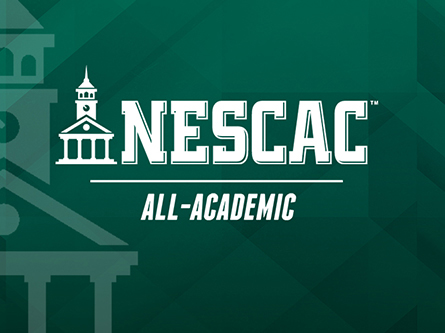Photo courtesy of Connecticut College.
The New England Small College Athletic Conference (NESCAC) has some of the strictest Covid-19 protocols amongst colleges, and appears to be continuing on that trajectory. All 11 schools require vaccination and masks inside at all times. Within the NESCAC, seven out of the eleven schools are currently testing students twice a week: Amherst, Bates, Bowdoin, Colby, Connecticut College, Tufts, and Wesleyan. Hamilton and Williams currently test once a week. The outliers are Trinity and Middlebury, which have different testing protocols. Trinity tests its unvaccinated students once a week and conducts surveillance testing on 10-15% of the vaccinated student population each week. Surveillance testing is done to provide a look into how much Covid-19 is on campus, if any. Trinity’s surveillance testing tests around 300 random vaccinated students per week. Middlebury tests their unvaccinated students once a week and does not perform weekly testing of their vaccinated students. If a vaccinated student comes in contact with someone that tests positive for Covid-19, or if they feel sick, they can schedule an appointment at the testing center. On Middlebury’s Covid-19-19 information page, it refers to CDC guidelines that “fully vaccinated people with no Covid-19-19-like symptoms and no known exposure should be exempted from routine testing programs.” Testing is required for all students before athletic competition and travel, as all NESCAC varsity sports teams are rapid tested before games and meets.
Compared to Conn’s Covid-19 positivity rate in the past few weeks, none of the other NESCAC schools have experienced such a significant spike in cases. As of Sept. 24, Amherst, Bates, Hamilton, Middlebury and Trinity have had under 12 cases, and Bowdoin, Colby, Wesleyan and Williams recorded under 46 cases. Tufts is not included in this count because it is not comparable to the other colleges in the NESCAC due to its student population size and multiple campus locations.
The low case numbers at other schools do not necessarily mean that their students are acting differently than students at Conn. In a recent email to students, Amherst warned that there were large indoor gatherings of unmasked students and that “significant numbers of students were missing their assigned testing days.” A student at Bowdoin, who wishes to remain anonymous, said that off-campus gatherings and trips to local bars were the norm. Trinity reported a “lack of compliance [of mask wearing] in common areas such as the dining hall, the fitness center, and the library.”
The extensive testing conducted in the NESCAC demonstrates how breakthrough cases are not unusual, and every school has reported that none of their positive students have experienced a severe case of Covid-19. While testing and preventative measures are a top priority in the NESCAC, this is not the case at other colleges. The Covid-19 policies of the Ivy League most closely align to the NESCAC, but there are differing protocols across colleges in the Northeast. Many schools, including Sacred Heart, University of Connecticut, Boston College, St. Anselm’s, and New York University conduct randomized testing of the vaccinated student population (athletes are subjected to more testing in some cases). The University of Vermont, Springfield College, the University of Rhode Island, Bryant University, and Fairfield University do not have surveillance testing programs, but have tests available to vaccinated students if they wish to be tested. Indoor masking is required at most colleges, with numerous exceptions for vaccinated students across campuses, such as maskless but socially distant fitness centers, and no masks required in residence halls or private campus buildings.
Vaccine hesitancy and Covid-19 denial is widespread in the South, and the policies of colleges reflect the regional vaccine divide. 253 colleges in the Northeast require the Covid-19 vaccine, while only 90 colleges in the South require vaccination. Georgia has over 70 colleges, and a mere eight require vaccination against Covid-19. At the ten largest colleges in the country by undergraduate student population size, Liberty University, Texas A & M, University of Central Florida, Florida International University, Arizona State University, University of Texas at Austin and Pennsylvania State do not require vaccination. The remaining three, Ohio State, University of Maryland, Utah Valley University and the University of Minnesota, do require vaccination.
The pandemic continues to shape student life at colleges and universities across the country, some more than others. Some college administrations, such as those in the Ivies and NESCAC, want to closely monitor Covid-19 levels and implement and enforce mitigation measures, while others have taken a passive approach in dealing with the virus. Covid-19 will continue to impact the college experience, and in time there will be more insight as to which measures are best when it comes to Covid-19 protocols, or lack thereof.










